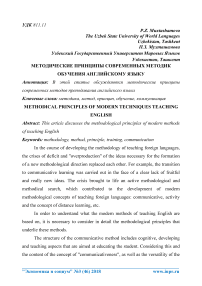Methodical principles of modern techniques teaching English
Автор: Muxtashamova P.Z.
Журнал: Экономика и социум @ekonomika-socium
Статья в выпуске: 3 (46), 2018 года.
Бесплатный доступ
This article discusses the methodological principles of modern methods of teaching English
Methodology, method, principle, training, communication
Короткий адрес: https://sciup.org/140236362
IDR: 140236362
Текст научной статьи Methodical principles of modern techniques teaching English
In the course of developing the methodology of teaching foreign languages, the crises of deficit and "overproduction" of the ideas necessary for the formation of a new methodological direction replaced each other. For example, the transition to communicative learning was carried out in the face of a clear lack of fruitful and really new ideas. The crisis brought to life an active methodological and methodical search, which contributed to the development of modern methodological concepts of teaching foreign languages: communicative, activity and the concept of distance learning, etc.
In order to understand what the modern methods of teaching English are based on, it is necessary to consider in detail the methodological principles that underlie these methods.
The structure of the communicative method includes cognitive, developing and teaching aspects that are aimed at educating the student. Considering this and the content of the concept of "communicativeness", as well as the versatility of the training system, we can formulate the following methodological principles of the communicative methodology:
The principle of mastering all aspects of foreign culture through communication. The communicative method first put forward the proposition that communication should be taught only through communication. In this case, communication can be used as a channel of upbringing, cognition and development.
Communication is a social process in which an exchange of activities, experiences embodied in material and spiritual culture occurs. In communication, emotional and rational interaction of people and influence on each other are realized. Communication is the most important condition for proper education.
Thus, communication performs the functions of learning, cognition and development and upbringing in a communicative teaching methodology.
The process of teaching foreign-language communication is a model of the process of the real process of communication on the basic parameters: motivation, purposefulness, informative process of communication, novelty, situativeness, functionality, the nature of interaction between communicants and the system of speech resources. Thanks to this, the conditions for training adequate to the real are created, which ensures the successful mastery of the skills and their use in conditions of real communication.
The principle of interrelated learning aspects of foreign culture.
The complex nature of foreign culture is manifested in the unity and interrelation of its educational, cognitive, educational and developmental aspects. Each of these aspects, in a practical sense, is equivalent. But the true mastery of one is possible only if one has the proper mastery of others.
In this regard, any kind of work, any exercise in the learning process, integrates all four aspects of the culture in another language and is evaluated depending on the availability of these aspects in them.
This principle applies not only to inter-dimensional, but also intra-aspect relationships. Thus, for example, the interrelation and interdependence of all four types of speech activity (reading, speaking, listening and writing) is assumed within the learning process.
The need for interrelated training is justified by the regularity of learning, according to which mastery occurs the more successfully the more analyzers participate in it. Interconnection is present not only in the learning process, but also in individual exercises specifically developed within the framework of this methodology.
"Экономика и социум" №3 (46) 2018


